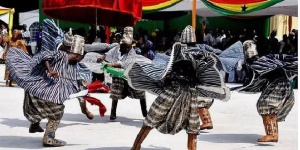 Ghanaians place great priority on their rich cultures and norms
Ghanaians place great priority on their rich cultures and norms
Ghana is known to be the hub of hospitality. The people are often described by tourists, especially, as welcoming and receptive of strangers.
As a land of countless tribes and an abundance of languages and customs, Ghana is ripe with a diversities that make the country truly unique and special.
Below are some of the cultures unique to
Read full articleGhanaians
Greetings and Handshakes
Greetings hold a special place in the hearts of locals no matter the tribe one belongs.
Usually accompanied by handshakes which are the most common form of greetings, the act is a sign of acknowledgement, respect.
A peculiarity with handshake greeting in Ghana is when the middle finger snaps the middle finger of the person you are shaking. The louder the snap, the better.
However, to disregard a greeting is a seen as an offence to most indigenes especially with adults. One could be seen as not having proper upbringing which, in most cases, is an embarrassment to the family the offender comes from.
Most greetings are in the dominant local language and are followed by questions about one’s health, the family welfare, the journey etc.
The use of the left hand is an abomination
In Ghana, anything done with the left hand is considered rude. It is traditional to use the right hand to give and receive items, eat, as well as make gestures. Also, when talking to elderly person, a Ghanaian must not gesture with his left hand as Ghanaians place values on elders.
Family Oriented
Family means everything to Ghanaians. Except for recent times where people prefer to be with the nuclear family only, the extended family has for years, been what Ghanaians understood to be the biggest support of an individual. It provided a sense of belongingness, protection and pride.
It was always a joy to have aunts, uncles, cousins, nieces, nephews, visiting grandparents, who usually reside at the family house, on special occasions.
Nonetheless family still means more to Ghanaians.
‘You are invited’
In Ghana, almost everything is shared no matter the amount. These three words, although rarely taken literally, signifies that one is willing to share his food.
If a Ghanaian is interrupted while eating, he invites the other to join him. Depending on the level of familiarity, the person may wash his hands and join in. If the relationship is casual, it is tradition for the other person to politely decline.
Festivals
Ghana is often described as a land of festivals, music, and traditional dances. Annual celebrations are customary for most communities, clans, and tribes. Aside language, festivals are what separate one tribe from the other.
While some take a few days, others have a week-long celebration of merry-making, drumming, sacrifices, and durbars. Festivals in Ghana often starts from the premises of traditional rulers, known as palace, then proceeds to the town where people eat, drink, and dance.
For some like the Kwahu festival, indigenes travel from far and wide to experience the nostalgia of how it was growing up.
Flexible Timekeeping
Ghanaians are essentially laid-back people, making for a more gentle approach to life. Although this can be very frustrating especially for someone who is time conscious, it is often rare to find Ghanaians attend an event or meeting at the given time.
‘I’m on my way’ and ‘I’m almost there’ are some of the responses when one is running late or have not even gotten to the destination.
That is why in Ghana, GMT stands for Ghana Man Time!











